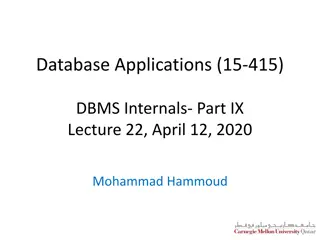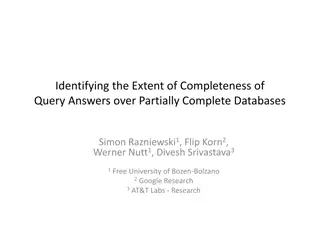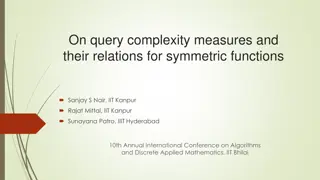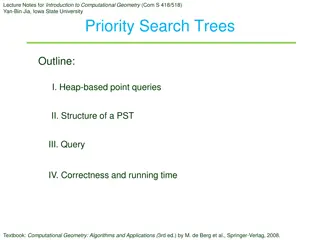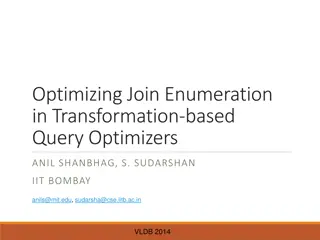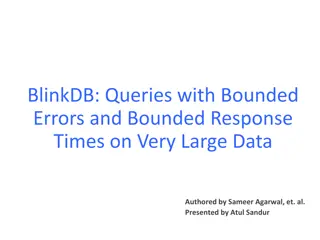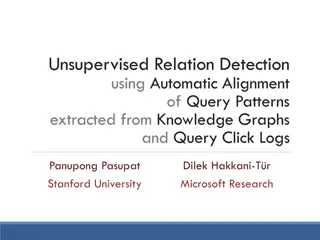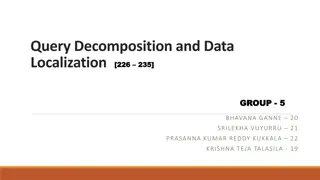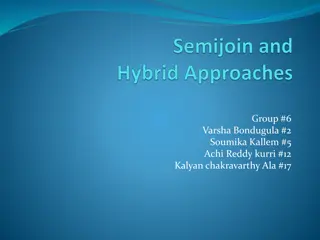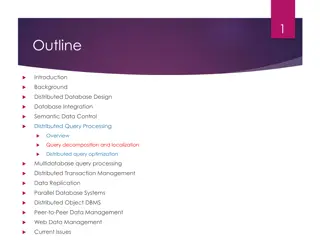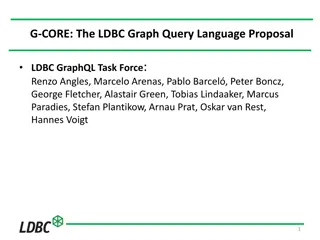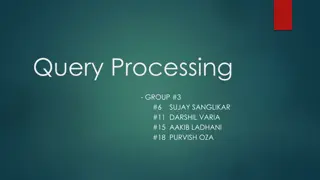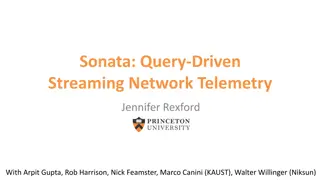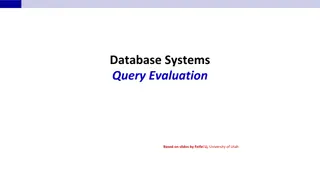Overview of Distributed Systems: Characteristics, Classification, Computation, Communication, and Fault Models
Characterizing Distributed Systems: Multiple autonomous computers with CPUs, memory, storage, and I/O paths, interconnected geographically, shared state, global invariants. Classifying Distributed Systems: Based on synchrony, communication medium, fault models like crash and Byzantine failures. Comp
19 views • 126 slides
Query Optimization in Database Management Systems
This content covers the fundamentals of query optimization in Database Management Systems (DBMS), including steps involved, required information for evaluating queries, cost-based query sub-system, and the role of various components like query parser, optimizer, plan generator, and cost estimator. I
5 views • 51 slides
Identifying Completeness of Query Answers in Incomplete Databases
The study delves into how to assess the completeness of query answers when dealing with partially complete databases. By analyzing data from a telecommunication company’s data warehouse, the query results are examined to determine if all warnings generated by maintenance objects with hardware team
2 views • 23 slides
Quantum Query Complexity Measures for Symmetric Functions
Explore the relationships between query complexity measures, including quantum query complexity, adversary bounds, and spectral sensitivity, in the context of symmetric functions. Analysis includes sensitivity graphs, the quantum query model, and approximate counting methods. Results cover spectral
1 views • 19 slides
Introduction to Priority Search Trees in Computational Geometry
This lecture outlines the structure and query process of Priority Search Trees (PST) in computational geometry. It covers heap-based point queries, range trees for windowing queries, handling query ranges in 1D and 2D spaces, and using heaps to efficiently handle query ranges. The content discusses
4 views • 18 slides
Optimizing Join Enumeration in Transformation-based Query Optimizers
Query optimization plays a crucial role in improving database performance. This paper discusses techniques for optimizing join enumeration in transformation-based query optimizers, focusing on avoiding cross-products in join orders. It explores efficient algorithms for generating cross-product-free
2 views • 18 slides
Overview of BlinkDB: Query Optimization for Very Large Data
BlinkDB is a framework built on Apache Hive, designed to support interactive SQL-like aggregate queries over massive datasets. It creates and maintains samples from data for fast, approximate query answers, supporting various aggregate functions with error bounds. The architecture includes modules f
2 views • 26 slides
Unsupervised Relation Detection Using Knowledge Graphs and Query Click Logs
This study presents an approach for unsupervised relation detection by aligning query patterns extracted from knowledge graphs and query click logs. The process involves automatic alignment of query patterns to determine relations in a knowledge graph, aiding in tasks like spoken language understand
1 views • 29 slides
Query Processing in Relational Algebra: Transforming, Estimating Costs, and Generating Plans
This content delves into the intricacies of query processing at the relational algebra level. It covers transformations, estimation of costs, detailed query plan generation, and plan comparison. The process involves estimating the cost and size of query plans, calculating the number of IO operations
0 views • 20 slides
Query Decomposition and Data Localization
This content discusses the process of query decomposition and data localization in databases. It covers topics such as analysis of query graphs, elimination of redundancy in queries, and rewriting queries for better efficiency. The examples provided illustrate the importance of semantic correctness
0 views • 25 slides
Converting Logical Query Plans to Physical Query Plans in DBMS
Illustrations and steps involved in the process of converting logical query plans (LQP) to physical query plans (PQP) in database management systems (DBMS), focusing on optimization, algorithm implementation, and handling security issues. The images provide a visual guide to constructing physical qu
2 views • 36 slides
Report Writers Meeting with Query Performance Tips
A meeting was held on 12/08/2015 with Gary Yates to discuss query performance tips for report writers. The session covered important aspects such as retrieving necessary fields, using single list views or crosstabs effectively, and keeping query calculations simple. Additionally, insights on partiti
0 views • 14 slides
Efficient Query Execution on Raw Data Files
This research explores NoDB, a database system designed to eliminate the bottleneck of data-to-query time by querying raw data files in their original location. By redesigning the query processing layer to query raw data in situ state while automatically creating auxiliary structures, NoDB aims to m
0 views • 34 slides
Fuzzy Query Processing in Distributed Relational Databases
One of the key applications of fuzzy sets is in computational linguistics, where linguistic variables and fuzzy terms play a crucial role in approximate reasoning. This course explores the concept of linguistic variables, fuzzy terms, membership functions, linguistic hedges, and operations on fuzzy
2 views • 4 slides
Relational Database Query Execution
In the world of relational databases, query execution is a crucial process involving steps like compilation, optimization, and physical plan generation. This involves converting SQL queries into logical query plans, selecting algorithms, and optimizing operations for efficient performance. Different
4 views • 9 slides
Data Integration with Dependent Sources: Query Answering System
An exploration of a system called IDS for integrating dependent sources in data processing. The paper addresses theoretical challenges, focusing on query answering with dependent sources. Investigates source selection, computation, coverage, configuration, cost, and more. Proposes solutions for choo
2 views • 36 slides
Adaptive Processing for Distributed Skyline Queries
This study delves into adaptive processing for distributed skyline queries over uncertain data, focusing on the challenges of efficiency and progressiveness. The research addresses the growing importance of distributed environments in skyline query optimization, presenting a novel framework for enha
2 views • 22 slides
Optimizing Distributed Query Processing with Semijoin and Hybrid Approaches
Learn about semijoin-based and hybrid approaches for optimizing distributed query processing. Explore how the hill-climbing algorithm minimizes communication costs in semijoin-based approach, and the challenges of cost estimation in distributed systems with the hybrid approach.
0 views • 20 slides
Distributed Database Design and Query Processing Overview
This presentation covers various aspects of distributed database design, integration, semantic data control, query processing, optimization, transaction management, replication, parallel systems, object DBMS, and more. Explore query decomposition, localization, and optimization strategies, along wit
3 views • 18 slides
Distributed Database Design and Query Processing Overview
This content provides insights into distributed database design, integration, semantic data control, query processing methodology, transaction management, data replication, and more. It discusses query decomposition, optimization, multidatabase processing, and current issues in the field.
2 views • 75 slides
Efficient Query Processing Techniques in Database Systems
Explore the innovative approach of plan bouquets for robust query processing in databases, along with the challenges and solutions in declarative query execution. Dive into cost-based query optimization strategies to enhance SQL query performance significantly by selecting the most efficient executi
2 views • 51 slides
Distributed Database Design and Query Processing Techniques
Explore the intricacies of designing distributed databases, integrating databases, controlling semantic data, and processing queries efficiently. Learn about query optimization, distributed transaction management, data replication, parallel database systems, and more in the realm of distributed data
8 views • 29 slides
Probabilistic Query Answering Techniques and Applications
Explore the definition and query processing methods of probabilistic query types like Probabilistic Group Nearest Neighbor Query. Learn about Group Nearest Neighbor Queries in Uncertain Databases, their applications in scenarios like selecting a restaurant, and other GNN applications in fields such
5 views • 34 slides
Logic Query Plan Optimization Techniques for Database Systems
Explore cost estimation for query plans, query optimization via logic and size, and improving logic plans using commutative and associative operators. Learn about efficient algorithms, optimizing logic laws, and proof techniques for optimizing database query performance.
1 views • 55 slides
Enhancing Graph Query Languages for Industrial Applications
Explore the proposal for G-CORE, a graph query language designed by the LDBC GraphQL Task Force to enhance industrial graph query languages. The approach involves deep academic analysis to ensure both power and practicality in query execution.
2 views • 65 slides
Edge-Centric Ensemble Scheme for Query Assignment
Explore an ensemble scheme for queries assignment in the Internet of Things era. Research focuses on managing data streams at the edge, utilizing Edge Nodes as distributed data repositories. Learn about query allocation, Query Controllers, complexity classification, and decision-making for load dist
11 views • 21 slides
Exploring the Layers of Query Processing in Distributed Systems
Delve into the intricacies of query processing in distributed systems, covering topics such as types of query processors, optimization strategies, decision sites, network topology exploitation, and more. Learn about languages used in object DBMS, optimization timing, statistics, and the exploitation
1 views • 14 slides
Query-Driven Streaming Network Telemetry with Flexible Telemetry for Management
Explore the innovative Sonata project led by Jennifer Rexford and team, focusing on query-driven streaming network telemetry. Learn about the spark-like query language, query-driven collection and analysis, and compiling individual operators to enhance network management and security. Discover the p
0 views • 15 slides
Parameter Sniffing and Query Optimization
In this insightful content, Benjamin Nevarez explores the intricacies of parameter sniffing, the Query Optimizer, and various aspects of parameterization in SQL Server. Dive into the world of query plans, plan reuse, and the impact of parameter values on query performance. Gain a deeper understandin
0 views • 22 slides
Parameter Sniffing and Query Optimization
In this content, Benjamin Nevarez discusses the concepts of parameter sniffing, query optimization, and parameterization in SQL Server. He explains the purpose of the query optimizer and procedure cache, different types of parameterization, and provides examples of explicit and implicit parameteriza
0 views • 9 slides
Parameter Sniffing Insights
Speaker Benjamin Nevarez discusses the Query Optimizer's purpose in analyzing and selecting execution plans, the Procedure Cache's role in caching query plans for reuse, and the importance of Parameterization in optimizing query performance. Learn about different types of Parameterization and their
0 views • 14 slides
Query Processing in Database Systems: Understanding SQL Query Execution
Explore the fundamentals of query processing in database systems with a focus on SQL query evaluation. Learn about single-table queries, query optimization, execution, and executor architecture. Understand how to process basic queries and utilize distinct selections, ordering, and grouping for effic
1 views • 70 slides
DBMS Internals: Query Optimization Strategies
In this lecture, we delve into the strategies and steps involved in query optimization within a Database Management System (DBMS). From parsing queries to evaluating query plans, the process is broken down systematically. Cost estimation, catalog inspection, and selecting the optimal query execution
4 views • 51 slides
Query Decomposition and Data Localization
Explore the process of query decomposition and data localization in databases, covering normalization, analysis, and the importance of transforming queries for efficient processing. Learn about disjunctive and conjunctive normal forms and how query analysis helps ensure query correctness.
1 views • 16 slides
Query-Oriented Topic Summarization Solutions
Explore the research on multi-topic-based query-oriented summarization by Jie Tang, Limin Yao, and Dewei Chen. The study delves into identifying major topics in returned documents, statistics on multi-topic coverage, challenging questions in topic identification and summary extraction, and the propo
3 views • 26 slides
DBMS Internals and Query Optimization: Understanding Relational Algebra Equivalences
Delve into the world of DBMS internals and query optimization by exploring relational algebra equivalences. Learn how a relational query optimizer uses equivalences to identify equivalent expressions, allowing for efficient query processing in database applications.
0 views • 65 slides
Understanding the Significance of Query Logs in Various Fields
Explore the utility of query logs in diverse sectors such as Social Sciences, Medical & Health, Advertising & Marketing, and Law Enforcement. Understand search behavior trends, categorize queries, improve document scoring, enhance performance through query caching, and address privacy concerns in in
4 views • 8 slides
Database Relational Query Languages Overview
Explore the fundamentals of relational query languages in database systems, including relational model concepts, formal languages, relational algebra, and selection operations. Understand how query languages allow manipulation and retrieval of data efficiently, optimizing access to large datasets wi
0 views • 26 slides
Distributed Database Design and Query Processing Overview
Explore the intricacies of distributed database design and query processing, covering topics such as database integration, semantic data control, distributed query optimization, multidatabase query processing, and more. Delve into the challenges and strategies for selecting the best query processing
0 views • 18 slides
Advanced Distributed Database Processing
Explore the intricacies of distributed database design, query optimization, and query processing methodologies. Dive into topics like distributed query decomposition, data replication, and semantic data control for a comprehensive understanding of managing distributed databases efficiently.
1 views • 29 slides

